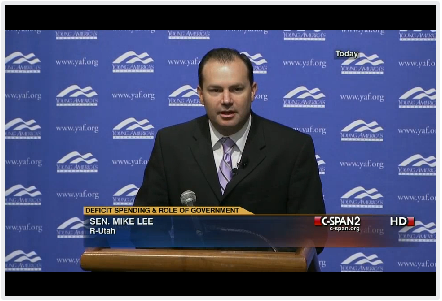Fairview Town Hall Recap
Aug 31, 2011
Around 150 people attended and the issues ranged from spending in Washington to immigration to the Narrows project. I heard many people voice concerns that Washington was not doing its job addressing illegal immigration into our country. They said that state legislators in Utah had tried to do something about the problem but that ultimately the federal government would have to step up enforcement. I couldn’t agree more, and would add that part of the problem is how difficult it is to come to this country legally. By addressing the backlog of legal immigration we can significantly reduce the motivation to come here illegally.
Congress Needs Structural Reform
Aug 30, 2011
There is very little accountability in Washington when it comes to how the federal government spends taxpayer money. Having watched how things work from the outside, I was frustrated at the obvious waste and abuse of Americans’ hard-earned dollars. The system looked like it was intentionally set up so Congress and the President could continually find ways to put off difficult decisions.
Washington doesn't know best
Aug 29, 2011
It's well past time to have a spirited debate over the proper role of government, and the proper reach of government into our lives. Clearly, there are two very different visions for what this role should be.
Coming to a Town Hall Near You
Aug 24, 2011

During the final week of August, Senator Lee will be attending several town hall events in southern Utah. Senator looks forward to meeting with Utah's citizens to discuss the important issues facing our nation. All are invited to attend. You can find the time, date, and location of each event below:
Restoring the Limited Role of the Federal Government
Aug 11, 2011

We have to get out of it. Our ability to provide jobs, our ability to continue to be the world's most robust economy depends upon getting our house in order, but it is not just our financial well-being, it is also our individual liberty that will benefit as we take this step, as we pass a balanced budget amendment, and as we restore that which is properly ours.
U.S. Senator Mike Lee Responds to S&P Downgrade of United States
Aug 5, 2011
U.S. Senator Mike Lee responded to S&P lowering the long held AAA rating for the United States saying, “This downgrade confirms what we have known was coming, but have chosen to ignore. It confirms that the true threat to our country, our economy and our way of life is our debt and the continued deficit spending Washington and the Obama administration are pursuing.”
Heller, Lee , Four Senators Demand Transparency from Joint Committee
Aug 4, 2011
The American people have a right to know what their government is going to do with their tax dollars. Not only do closed door meetings by this Committee prevent the public from knowing how their dollars are being spent, but these meetings also have the potential to promote deals with special interests. Open door proceedings will allow the public to be their own advocates, rather than relying on games of inside baseball that too often dominate today’s Washington.
Lee Congratulates Barlow on Nomination
Aug 3, 2011
Today, Senator Lee congratulated David Barlow on his nomination as U.S. Attorney for the State of Utah.
Moving Forward -- Day Lee Briefing 8/03/2011
Aug 3, 2011
Colleen Bangerter had many friends in many corners. And she had many talents, including the fact she was the state hopscotch champion in Utah in 1947. There are not many first ladies who can claim that distinction and she definitely did. She was the recipient of the highest award granted by the Boy Scouts of America, which she received a few years ago.
All for a Cut of Two-Tenths of a Percent -- Day Lee Briefing 8/02/2011
Aug 2, 2011
Now, there are significant cuts discussed in this legislation as proposed, but I want to be clear on one thing. Although these cuts are large on a long-term basis, on a short-term basis, they are less so. On a short-term basis, within the next year, this proposes to cut about $7 billion, out of the fiscal year 2012 discretionary spending budget.
